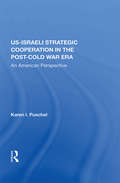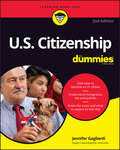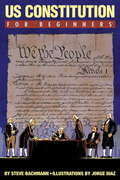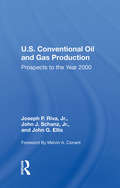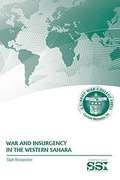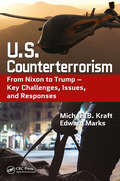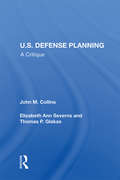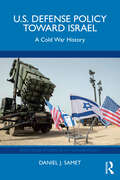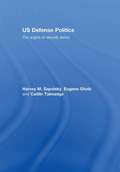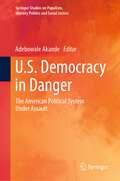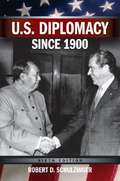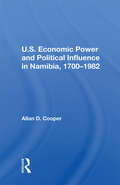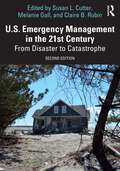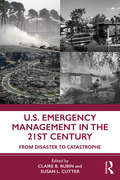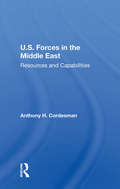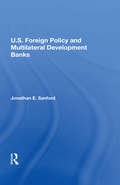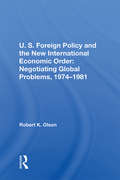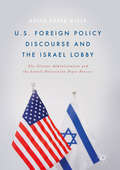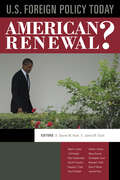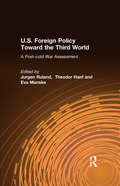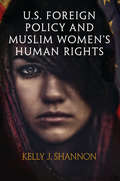- Table View
- List View
U.S. - Israeli Strategic Cooperation In The Post-cold War Era: An American Perspective
by Karen PuschelThis study moves from a history of the American-Israeli strategic relationship since 1967 to an assessment of the permanency of US-Israeli strategic ties, their purpose in the eyes of both partners, and their susceptibility to future pressures. It includes an examination of the relationship under the strain of the 1991 Gulf War.
U.S. Citizenship For Dummies
by Jennifer GagliardiBecome a U.S. immigration wiz with this hands-on and practical guide to U.S. citizenship In U.S. Citizenship For Dummies, expert citizenship and ESL instructor Jennifer Gagliardi walks you through the ins and outs of the complicated process of obtaining citizenship in the United States. From preparing for test day to understanding the interview process and learning about recent changes to immigration laws, this book demystifies the legal process of transforming a foreign national into a citizen of the U.S. In this book, you’ll get: Up-to-date info on the various application and immigration forms you’ll need to complete to become a citizen Needed preparation for the all-important interview Complete coverage of the different visas and green cards available to foreign nationals and how you can qualify for themWhether you’re an immigrant-to-be who’s interested in becoming an American citizen, or you’re already a citizen but you want to bone up on U.S. history, government, and civics knowledge, U.S. Citizenship For Dummies is the perfect guide to the procedural and substantive knowledge you need to understand the American immigration system.
U.S. Competitiveness in Science and Technology
by James Hosek Titus GalamaIs the United States in danger of losing its competitive edge in science and technology? This volume reviews the arguments surrounding this issue and contrasts them with relevant data, including trends in research and development investment; information on the size, composition, and pay of the U.S. science and engineering workforce; and domestic and international education statistics. The authors conclude with recommendations for policymakers.
U.S. Constitution Book (The Everything®)
by Ellen M KozakDebates over constitutional rights impact you every day as an American citizen. But do you know what the U.S. Constitution actually says? This accessible guide contains the complete text of the Constitution, with short, descriptive margin notes throughout. Articles and amendments are then analyzed in depth to help you comprehend the basis of democracy. This valuable handbook covers:How the articles and amendments were draftedInsight into the intentions of the creators and the sources they usedControversial interpretations and Supreme Court decisionsHow the Constitution affects citizens every dayThe Declaration of Independence, the Articles of Confederation, and unratified Constitutional amendmentsThis book walks you through the history of this essential document and shows how it has guided lawmakers and judges for more than 200 years. This unbiased look at the Constitution will help you feel confident in your knowledge of this all-important document, gain a firmer understanding of how our government works, and put context around today's most pressing issues.
U.S. Constitution For Beginners
by Steve Bachmann Jorge DiazIn a combination of witty text and crisp illustrations, U.S. Constitution For Beginners takes a tongue-in-cheek look at America's most critical legal document. Author and lawyer Steve Bachmann has written a text that touches on the document's history beginning all the way in 1215 AD with the Magna Carta. He then traces the events that precipitated its writing, the personalities and motives of the people who created it, and its use and misuses since ratification. Though hotly debated and constantly reinterpreted, the Constitution has survived wars, industrialization, expansion and politicians. U.S. Constitution For Beginners analyses crucial elements of this binding set of principles and ponders the future of the Constitution as well as the role of American citizens.
U.S. Conventional Oil And Gas Production: Prospects To The Year 2000
by Joseph RivaThe authors of this book assess the prospects for production of oil and gas from U.S. domestic reserves and resources to the year 2000, using different scenarios with varying assumptions about numbers of new discoveries, size of fields, and rates of recovery. Oil production, claim the authors, will decline by at least 17 percent by the end of the c
U.S. Counterterrorism in Sub-Saharan Africa: Understanding Costs, Cultures, and Conflicts
by Donovan ChauSub-Saharan Africa (SSA) has never been the centerpiece of U.S. foreign and defense policy. Yet the current struggle between the United States and its allies against terrorist groups and individuals motivated by Islamic extremism thrusts SSA forward as a front in the global conflict. The author asks, centrally, what is the most effective long-term approach to U.S. counterterrorism in SSA. By comparing views in Washington, DC, with perspectives from SSA, he assesses that a fundamental and dangerous misunderstanding of SSA may be leading U.S. policy astray. Recommending a new grand strategic approach to U.S. counterterrorism policy, he suggests urgently educating a future generation of analysts, officers, and policymakers on SSA--whose interest must match their knowledge and understanding.
U.S. Counterterrorism: From Nixon to Trump – Key Challenges, Issues, and Responses
by Michael B. Kraft Edward Marks"Writing with years of experience in government, Ambassador Edward Marks and Michael Kraft have produced a splendid history of America’s long campaign against terrorism. The book analyzes the recent changes in technology and tactics that have profoundly altered today’s terrorist challenge…to understand where we are and how we got there, start here."—Brian Michael Jenkins, The Rand Corporation "…This book provides important perspective on where the United States has been in this fight and how that fight must evolve in the new administration. It is must reading for the Trump Administration and anyone else seriously concerned about the next steps in this long struggle." —Brig. Gen. Francis X Taylor, USAF (Rtd.), Former U.S. Coordinator for Counterterrorism and DHS Under Secretary for Intelligence and Analysis "…an indispensable guide to U.S. counterterrorism efforts and policies spanning five decades and nine presidencies … (The book) fills a significant gap in the literature by providing an invaluable historical context to this unending struggle." —Professor Bruce Hoffman, Director, Security Studies, Georgetown University "A clear and comprehensive survey of American policy toward terrorism over the past half century … it provides essential background for analysis of future policy." —Martha Crenshaw, Center for International Security and Cooperation, Stanford University U.S. Counterterrorism: From Nixon to Trump - Key Challenges, Issues, and Responses examines the "war on modern terrorism," from the Nixon administration to the early stages of the Trump administration. The book describes the evolution of U.S. counterterrorism responses to the changing terrorist threats, from primarily secular groups, to those with broad-reaching fundamentalist religious goals such as ISIS. The authors highlight the accelerating rate of changes in the terrorism situation from modern technology; the internet, "lone wolf" terrorists, cyber threats, and armed drones. The book describes the Bush Administration’s dealing with terrorism as an existential threat and a Global War on Terrorism following 9/11. It then discusses how the Obama administration both continued and modified previous policies. The book provides an extensive list of key documents for those interested in the original texts and a discussion of legal issues. U.S. Counterterrorism provides insights and a useful backdrop for future decisions by the new administration and Congress.
U.S. Defense Planning: A Critique
by John M CollinsSuperior defense plans fuse political, economic, military, technological, and sociological power in ways that cover state interests, while conserving resources to the greatest prudent extent. Poor products can increase costs without reducing risks, because forces and funds that support slipshod schemes often fail to furnish security. This critical appraisal of the U.5. defense planning system seeks to serve a five-fold purpose: • set assessment standards • appraise U.S. planning in principle • appraise U.5. planning in practice • identify U.S. planning problems and • present optional! courses of corrective action. The study shows how domestic and foreign policy inputs from the White House, National 5ecurity Council, and State Department affect defense planning.
U.S. Defense Policy toward Israel: A Cold War History (Routledge Studies in US Foreign Policy)
by Daniel J. SametThis book examines U.S. defense policy toward Israel during the Cold War, emphasizing arms sales, intelligence sharing, and other security cooperation. It argues that strategic interests drove American policy with other considerations, such as domestic politics and shared liberal values, mattering far less. It begins with the presidency of John F. Kennedy and ends with the presidency of George H. W. Bush with a particular focus on government officials: presidents, secretaries of state, secretaries of defense, national security advisors, other administration officials, and senators and Congressmen. The book explores the primacy of security as American officials feared nuclear proliferation, regional war, and a cut-off of oil supplies. All the while, tensions and often bitter disagreements in the U.S.-Israel relationship abounded over what to do about threats in the Middle East. This volume will be of interest to those studying American relations with the rest of the Middle East and U.S. security partnerships around the world.
U.S. Defense Politics: The Origins of Security Policy
by Harvey M. Sapolsky Eugene Gholz Caitlin TalmadgeThis new textbook explains how US defence and national security policy is formulated and conducted. Harvey Sapolsky and Eugene Gholz focus on the role of the President, Congress, political partisans, the defence industries, lobbies, and interest groups, including the military itself, in shaping policies. The book examines the following key themes: US grand strategy who joins America's military how and why weapons are bought the management of defence public attitudes toward the military and casualties the roles of the President and the Congress in controlling the military the effects of 9/11 on security policy, homeland security, government reorganizations, and intra- and inter-service relations. In addition to these core descriptive and analytical themes, the authors emphasize the process of defence policy-making rather than just the outcomes of that processa? a departure from the style of many existing textbooks. US Defense Policy and National Security will be essential reading for students of national security, US defence politics, and US public policy courses, and recommended for students of foreign policy, international security and political science.
U.S. Democracy in Danger: The American Political System Under Assault (Springer Studies on Populism, Identity Politics and Social Justice)
by Adebowale AkandeHistorically, Donald Trump will be remembered as the first American president to be impeached twice and indicted. He fed the grotesque myth that the election was stolen and summoned his supporters to storm Congress on 6 January 2021 in a bid to thwart the certification of Joe Biden's U.S. presidential election victory. This volume vividly recounts the dramatic narrative of the January 6 Coup in America and how close we came to losing U.S. democracy. For anyone seeking a comprehensive and multidisciplinary global overview of democracy, an astute analysis of the forces that drive the dominance of the (neo)liberal paradigm of the last decades should look no further than this volume. Yet the volume takes the issue further by vigorously documenting the decline of the U.S. treaty process (America’s dysfunctional diplomacy and the doctrine of unpredictability). There is an urgent need for a massive infusion of strategic support for democracy in the United States. Because come 2024 or thereafter an unfinished work might drag American democracy to a dangerous inflection point. Trump (who has a complete hold on the Republican party, still has a stranglehold on the MAGA base no matter what he does, was instrumental to the breaking of U.S. diplomacy. Undermining the democratic legitimacy of International Law adversely affected U.S. foreign policy. Some federal and lower courts in the judiciary of the United States pose a real threat to Americans’ democracy as well. To that end, when ‘the principle of truth’ loses its relevance and meaning as benchmarks for appraisals and decisions, and becomes a harmful tool for willful propaganda. Everybody should be worried about U.S. democracy. A "real" crisis is coming! U.S. Democracy is at a breaking point. Like a giant modern mirror standing behind democracy itself, this book is a citizen's guide to saving U.S. Democracy. Expertly drawn on global and regional examples and current literature, the volume closes a gap in the multidisciplinary field. Quite useful as a valuable resource as it helps us understand the shifting Trump agenda in diverse areas. Essential reference across a range of subjects, bringing together contributions from scholars, and policymakers alike. This extraordinarily well-researched and practically crafted, culture-inclusive text could not be more relevant or timelier. It is a must for everyone. This volume will help to shape the political landscape of the 21st century and will remain a vital source of inspiration for modern-day scholars and political activists.
U.S. Diplomacy Since 1900 (Sixth Edition)
by Robert D. SchulzingerThe book chronicles the major events in the history of U.S. foreign relations, from the Spanish-American-Philippine War to the present.
U.S. Economic Power And Political Influence In Namibia, 1700-1982
by Allan D. CooperThis first comprehensive examination of U.S. relations with Namibia offers a critical analysis of the economic and historical determinants of current U.S. policy in southern Africa. Dr. Cooper first traces American ties to Namibia dating from the 1700s, documenting an extensive commercial interest in the area prior to German colonization. Subsequen
U.S. Emergency Management in the 21st Century: From Disaster to Catastrophe
by Jon E. Keeley Susan L. Cutter Christopher T. Emrich Claire B. Rubin Monica Schoch-Spana Duane A. Gill Melanie Gall Sanam K. Aksha Susan Spierre Clark Alex Greer Arleen A. Hill Ayesha Islam Sarah L. Jackson “Gene” Longenecker, Herbert E. Liesel Ritchie Laura J. Stroup Alexandra D. Syphard William R. TravisOur understanding of hazards and disasters is rapidly changing, and it is unclear as to whether our existing management systems are adequate to adapt to current and future disasters. Thoroughly updated to include the latest research in the hazards and disasters field, U.S. Emergency Management in the 21st Century continues the tradition of giving readers access to exemplary case studies drawn from a wide variety of hazards and applied fields.NEW TO THE SECOND EDITION Discussion on COVID-19 pandemic and the lacking local capacity for preparedness. “Forgotten” hazards (heatwaves and coldwaves) in Phoenix, AZ and Buffalo, N.Y New challenges in hurricane preparedness and response with rapid intensification. Changing cycles of water volume in the west resulting in storage emergencies. Cascading hazards and out-of-sight water crises in the Southwest Extreme precipitation resulting in flash flooding in Tennessee, New York City, Montana, and Vermont. Updated conclusion describing divergence between federal, state, and local emergency management concerns and priorities. A new co-editor, Melanie Gall, recognized for her teaching and scholarship on natural hazards and emergency management. U.S. Emergency Management in the 21st Century remains an indispensable textbook on disaster case studies, emergency management policy and practice. An essential resource for students, public, and professionals alike.
U.S. Emergency Management in the 21st Century: From Disaster to Catastrophe
by Susan L. Cutter Claire B. RubinU.S. Emergency Management in the 21st Century: From Disaster to Catastrophe explores a critical issue in American public policy: Are the current public sector emergency management systems sufficient to handle future disasters given the environmental and social changes underway? In this timely book, Claire B. Rubin and Susan L. Cutter focus on disaster recovery efforts, community resilience, and public policy issues of related to recent disasters and what they portend for the future. Beginning with the external societal forces influencing shifts in policy and practice, the next six chapters provide in-depth accounts of recent disasters— the Joplin, Tuscaloosa-Birmingham, and Moore tornadoes, Hurricanes Sandy, Harvey, Irma, Maria, and the California wildfires. The book concludes with a chapter on loss accounting and a summary chapter on what has gone right, what has gone wrong, and why the federal government may no longer be a reliable partner in emergency management. Accessible and clearly written by authorities in a wide-range of related fields with local experiences, this book offers a rich array of case studies and describes their significance in shifting emergency management policy and practice, in the United States during the past decade. Through a careful blending of contextual analysis and practical information, this book is essential reading for students, an interested public, and professionals alike.
U.S. Facts and Fun: Grades 4-6 (U.S. Facts and Fun)
by Evan-MoorU.S. Facts & Fun, Grades 46 presents a variety of informative topics: Events, such as building the railroads, landing on the moon, and the Boston Tea Party. People, such as Davy Crockett, Chief Joseph, and Franklin Delano Roosevelt. Animals, such as bison, the grizzly bear, and the Morgan horse. Sites, such as Yosemite National Park, the Everglades, and the Jamestown Colony. Use these short stories to supplement your social studies curriculum, as research for student reports, or as independent activities that tie reading skills to the content areas.
U.S. Fiscal Policies and Priorities for Long-Run Sustainability
by Christopher Towe Michael Kell Martin Mühleisen Iryna Ivaschenko Roberto Cardarelli Paula De Masi Ayhan Kose Jim Prust Dominique SimardThis paper presents an overview of recent U. S. fiscal developments and discusses possible implications of the sharp turn around in the government's fiscal position. Against this back ground, it also reviews key policy challenges that will need to be addressed to cope with the mounting pressures on public retirement and health care systems during the next decade. the study draws principally from back ground papers that were prepared for the IMF staff's annual consultation discussions with the U. S. authorities in 2002 and 2003.
U.S. Forces In The Middle East: Resources And Capabilities
by Anthony H CordesmanThis volume provides the first detailed analysis of the trends in U.S. contingency capabilities since the end of the Gulf War, the impact of the Bush administration's "Base Force" policy, and the Clinton administration's "Bottom Up Review" of current U.S. contingency capabilities. It examines U.S. capabilities in the Gulf through the year 2001, the
U.S. Foreign Policy And Multilateral Development Banks
by Jonathan E. SanfordWith a review of the executive branch and congressional actions, this book provides the purposes and history of U.S. participation in the multilateral development banks and the relationship between process and goals in the formulation and application of U.S. Foreign policy.
U.S. Foreign Policy And The New International Economic Order: Negotiating Global Problems, 1974-1981 (Bloomsbury Academic Collections: Economics Ser.)
by Robert K OlsonThis is an up-to-date, authoritative account of the development of U.S. policy toward the New International Economic Order Nieo from its inception in 1974 through the Eleventh Special Session of the General Assembly in August-September 1980. Mr. Olson concentrates on the latter stages of the North-South dialogue, analyzing U.S. policy in the conte
U.S. Foreign Policy Discourse and the Israel Lobby: The Clinton Administration and the Israeli-Palestinian Peace Process
by Keith Peter KielyThis book seeks to debunk the popular myth of an all-powerful pro-Israel lobby. Here, Kiely demonstrates how discourses surrounding American Identity and US foreign policy towards the Israeli-Palestinian conflict, which has deep roots in American historicity, have constructed an understanding of the conflict which is inherently more susceptible to the Israeli narrative. Kiely argues that the so-called power of what other researchers, such as Mearsheimer and Walt (2006, 2007), call ‘The Israel Lobby’ are limited by these discourses. It is the author’s contention that groups such as The American Israel Public Affairs Committee (AIPAC) serve to amplify and reproduce existing representations within these discourses which align the United States and Israel in terms of cultural, historical and political values while simultaneously reinforcing dominant representations of the Palestinian ‘Other’.
U.S. Foreign Policy Today: American Renewal?
by Hook, Steven W. and Scott, James M.This new contributed volume from Steven Hook and James Scott introduces students to the conduct of foreign policy under the Obama administration. Its twelve original essays, written by a stellar cast of experts in the field, address whether the Obama administration’s strategy represents a "renewal" of U.S. engagement. To what extent has this administration succeeded in building both the domestic and international constituencies needed to implement its foreign policy goals? How exactly have Obama’s policies regarding drone strikes, prisoner abuse, extraordinary rendition, and climate change differed from Bush-era policies? Contributors provide detailed assessments of these and many other key questions.Designed to fit easily into courses on U.S. foreign policy, the volume’s first part looks at policy formulation, while the second part tackles policy domains. An extensive bibliography makes a great student resource for further research.
U.S. Foreign Policy Toward the Third World: A Post-cold War Assessment
by Jurgen Ruland Theodor Hanf Eva ManskeThe contributors to this work examine the evolution of U.S. foreign policy toward the Third World, and the new policy challenges facing developing nations in the post-Cold War era. The book incorporates the key assessment standards of U.S. foreign policies directed toward critical regions, including Latin America, Africa, the Middle East, Central Asia, and Southeast Asia. Through this region-by-region analysis, readers will get the information and insight needed to fully understand U.S. policy objectives - especially with regard to economic and security issues in the wake of 9/11 - vis a vis the developing world. The book outlines both successes and failures of Washington, as it seeks to deal with the Third World in a new era of terrorism, trade, and democratic enlargement. It also considers whether anti-Western sentiment in Third World regions is a direct result of U.S. foreign policies since the end of the Cold War.
U.S. Foreign Policy and Muslim Women's Human Rights (Pennsylvania Studies in Human Rights)
by Kelly ShannonAmericans' concerns about women's human rights in Muslim countries were triggered by the Iranian Revolution of 1979 and have evolved within the context of long-standing Western stereotypes about Muslims, as well as transnational feminism and the global human rights movement. <P><P> As these frameworks simultaneously competed against and reinforced one another, U.S. public conversations about Muslim women intensified, culminating in feminist campaigns and U.S. policies that aimed to defend women's rights in Islamic countries—such was the case with the Clinton administration's decision not to recognize the Taliban regime after they seized control of Afghanistan in 1996.U.S. Foreign Policy and Muslim Women's Human Rights provides a fresh interpretation of U.S. relations with the Muslim world and, more broadly, U.S. foreign relations history and the history of human rights. <P><P>Kelly J. Shannon argues that, as U.S. attention to the Middle East and other Muslim-majority regions became more focused and sustained, the issue of women's human rights in Islamic societies was one that Americans gradually identified as vitally important to U.S. foreign policy. Based on an analysis of a wide range of sources—including U.S. government and United Nations documents, oral histories, NGO archival records, news media, scholarship, films and television, and novels—and a wide range of actors including journalists, academics, activists, NGOs, the public, Muslim women, Islamic fundamentalists, and U.S. policymakers—the book challenges traditional interpretations of U.S. foreign policy that assert the primacy of "hard power" concerns in U.S. decision making. <P><P> By reframing U.S.-Islamic relations with respect to women's rights, and revealing faulty assumptions about the drivers of U.S. foreign policy, Shannon sheds new light on U.S. identity and policy creation and alters the standard narratives of the U.S. relationship with the Muslim world in the closing years of the Cold War and the emergence of the post-Cold War era.
